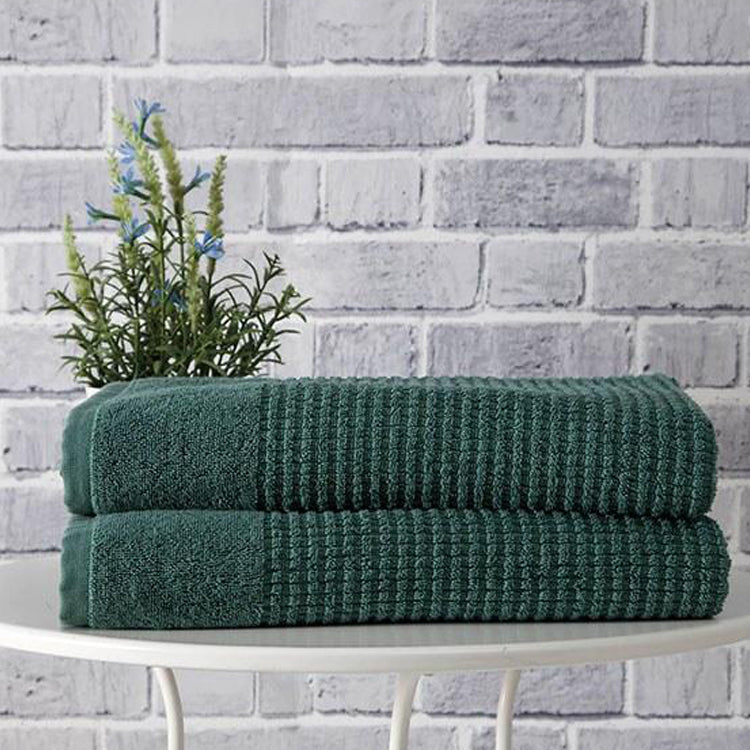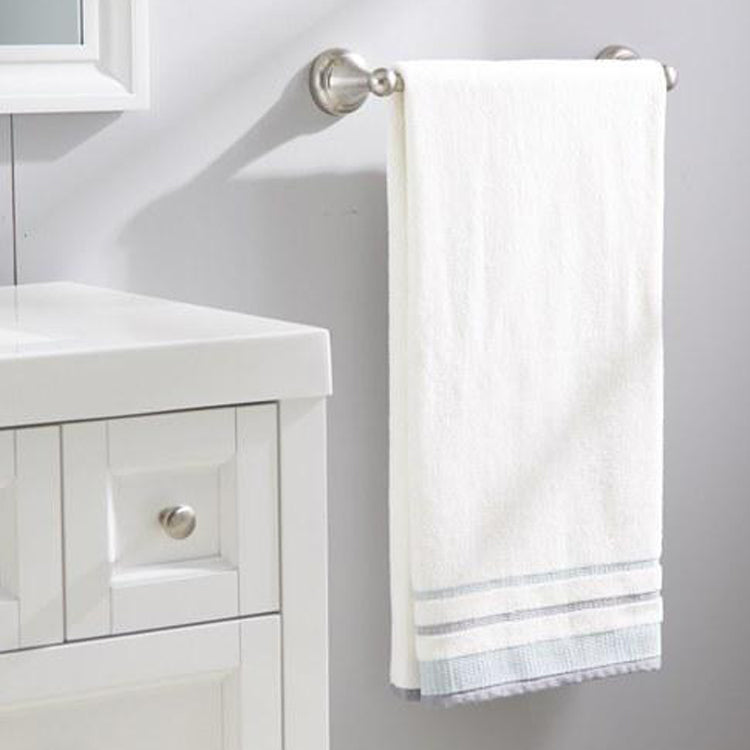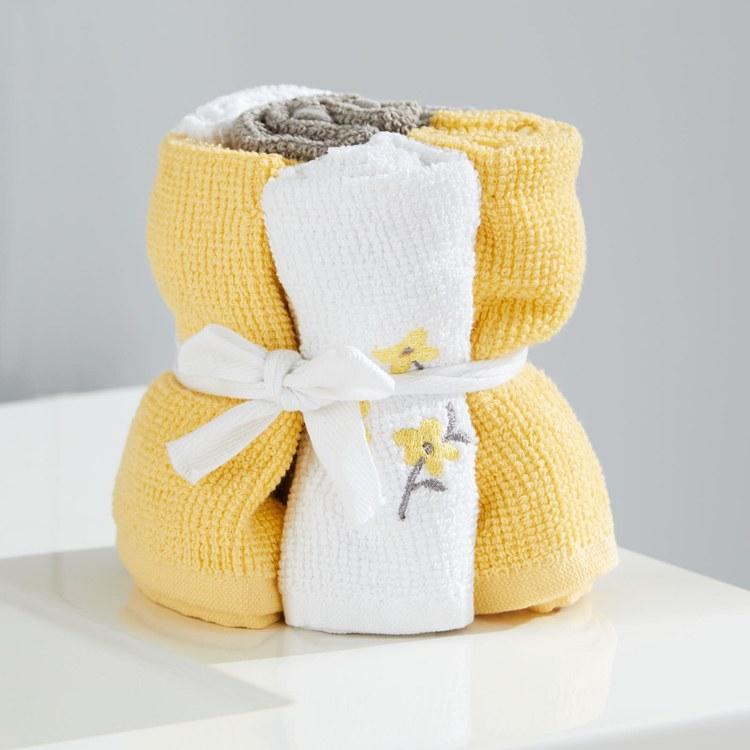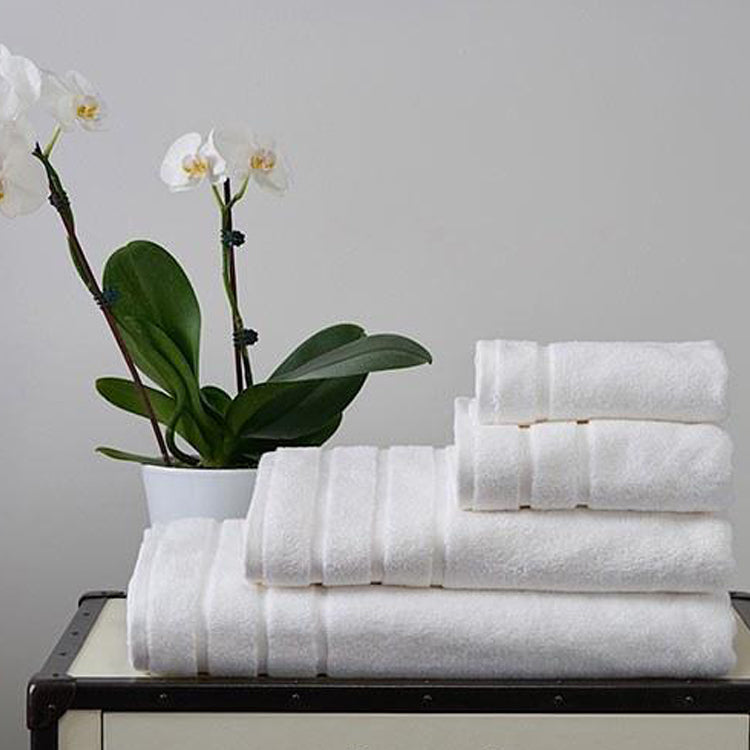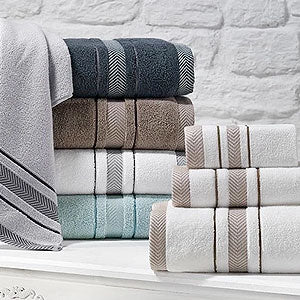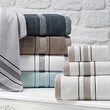Bath
Bath Towel Care Guide
Make Your Bath Towels Last With Proper Care
Premium, super-plush bathroom towels are the ultimate indulgence, and they can be a pricey investment, especially when stocking enough towels to handle the drying needs of a whole household. Once you have purchased the quality, sizes, and colors of towels you want, you need to properly care for them to ensure you get the most life and usefulness out of them. Here’s some simple tips to help you extend the life and effectiveness of your bath towels.
How to Clean Your Bath Towels
There’s more to properly cleaning your bath towels, hand towels, and washcloths than tossing them in the washer and dryer. There’s actually a right and wrong way to launder your bath room towels to keep them soft, fluffy, and fresh smelling. How you clean them and how often you wash them can make a difference in how they look, function, and last.
Launder your towels before you first use them
Once you have unpackaged your new towels, it’s a good idea to wash them with a ½ cup of white vinegar before you hang them up in the bathroom to use them the first time. The vinegar helps to set the dyes (especially on dark-colored towels) and helps keep the colors more fade resistant over time. Additionally, running your brand new towels through a wash and dry cycle will reduce the fiber shedding that can occur in new towels.
Wash your bath towels together
Cleaning all your bath towels together (separating lights from darks of course) will help prevent the towels from pilling. Pills occur when the short fabric fibers rub together with the long fibers in the weave, causing them to bunch and create little nubs or pills in the cloth. Over drying towels can also lead to pills, so make sure you dry them for only as long as necessary and remove them promptly once the dry cycle is complete.
Select the appropriate temperature and cycle setting
As with all your laundry, you should separate your white and light towels from the colored or dark ones. Set your machine’s temperature setting to the hot water cycle when washing whites and select warm or cold for the colors. Use the regular or normal wash cycle setting for your loads of towels. Select the regular or automatic cycle on your dryer which uses high heat to maximize the towel’s fluffiness.
Clean your towels in small laundry loads
When you have many dirty towels to launder, as tempting as it seems to stuff as many towels in one load to get the laundry done quicker, it’s better to wash the towels in smaller batches. Trying to wash too many towels at once can overload and damage your washing machine, prevent the towels from getting clean, and at the very least cause the load to become unbalanced and stop the machine from completely the wash cycle. Overstuffing the dryer also interferes with the machine’s ability to thoroughly dry your towels. Too many towels bunched together in the dryer will prevent the air from circulating properly to dry and fluff the fibers. A too-full load is heavier and will mat down the fibers, so your towels will come out stiff rather than soft and fluffy, and perhaps still a little damp instead of completely dry.
Remove residues and build-up with white vinegar
Over time, chemical residues from detergents and mineral build-up from hard water can become embedded in the fibers of your bath towels. Periodically, you should add a cup of white vinegar to your wash cycle to strip these residual chemicals and minerals from the fabric threads. Doing so will help the cloth fibers fluff up to restore the absorbency of the towels and make them feel softer to the touch.
Use baking soda to eliminate musty odors
We’re all done it, left damp or wet towels too long in a gym bag or beach tote before tossing them in the laundry pile. When wet towels are left enclosed in a bag and not allowed to dry, they can develop a musty odor. To refresh your bath towels and eliminate any odors, add a 1/2 cup of baking soda in with your detergent during the wash cycle. Your towels will come out smelling clean and fresh once again.
Use less detergent than you would with other loads
Avoid using too much detergent with washing your bath towels. Too much can stiffen the cloth fibers and reduce their softness. As a general rule of thumb, use approximately half the amount of laundry detergent on your towels than you would typically use on a similar size load of clothing.
Avoid using fabric softener
Though it may seem counterproductive, avoid using fabric softener when washing your towels. The ingredients in fabric softeners can leave a waxy build-up or film on the fabric threads and reduce the absorbency of your towels. Continued use of fabric softeners can also damage your towels over time but causing the fibers to mat and become stiff.
Further Care Tips for Your Towels
Besides laundering your bath towels regularly, there are a few other ways to properly care for your bath linens to get the most of them. Here’s some additional tips to consider when cleaning and maintaining your towels.
Treat towels with specialty trims as decorative accents or for infrequent guest use
Fabrics used in towel manufacture comes in many types and levels of quality. Some towels have accent trims such as ribbons, rickrack, or lace sewn on to the main fabric. Other may have embroidery used in designs or monograms. Many if not all of these decorative elements will wear faster than the towel fabric itself and limit the number of washings they can be subjected to before they wear. To get the longest life from these specialty towels, you should use them as decorative elements only or keep them for guest bathrooms where they will have less frequent use.
Launder regularly but not too frequently
Bath towels do not need to be laundered after each use. Daily washing adds to your work load, uses extra water and electricity, and leads to faster wear and fading of your towels. Instead, wash your bath towels every three to four days to maintain their fluffiness and cleanliness. After each use, hang them to dry over the shower stall door, draped over a towel bar (you can refold and hang them when dry), or on a towel warmer to air dry. After three to four uses, toss them in the laundry pile and replace them in the bathroom with fresh towels from the linen closet.
Refrain from ironing your towels
Except for linen towels, avoid ironing towels as this will flatten the fabric fibers, making them less fluffy. The direct heat of the iron can also damage the fibers. For wrinkle-free towels, promptly remove them from the dryer once the cycle is done, fold them neatly, and put them away whether it is back on the towel bar in the bathroom or stored in a linen closet or drawer. For best use of shelf space, fold bath towels and hand towels in thirds, then fold the towel in half with the open ends to one side, then in half again. When storing, face the outer edge of the towel to the front to make it easy to grab a single towel from the stack.
Choose the best towel materials
Cotton is the most popular choice for bath towels because of its absorbency, softness, and strength. How the cotton is processed and manufactured affects the efficacy and longevity of the towels. Towels dry you by absorbing water and brushing the water from your body via the fiber loops in the weave. Sheared towels where the tops of the thread loops are cut off are the most absorbent, but they are slower to dry. The more loops per square inch, the better the towels will perform.
Regularly replace your towels
Even with the best care, towels will wear out eventually from repeated use and frequent washing. They will lose fibers and become less absorbent. When they show signs of fading or are beginning to look a little threadbare, it’s time to replace them. Usually with proper care, you will get about two years of regular use out of your bath towels, bath sheets, hand towels, and washcloths. Luckily, high-quality towels are affordable and readily available in a wide range of designs and colors for you to choose from to replenish your supply.


